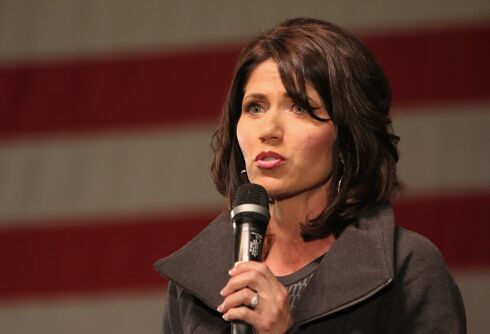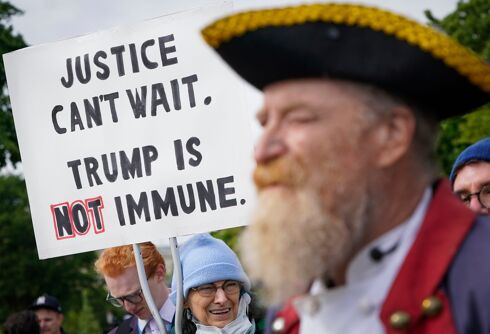“The part I took in defense of Capt. Preston and the soldiers procured me anxiety and [verbal abuse] enough.”
-John Adams, 1773
Last week, the publication of which I serve as executive editor (the Florida Agenda) printed a paid political advertisement that had been provided by the Broward County, Florida chapter of the Log Cabin Republicans.
The half page black and white ad depicted the late U.S. Ambassador Christopher Stevens, as his body was carried out of the U.S. Consulate in Benghazi, Libya, in which he had died moments earlier.
Since I had no involvement in the ad’s creation or participation in deciding whether the ad ran, I do not want to put words into the mouths (by way of explaining what they were thinking) of either the Broward LCR chapter or of their national organization.
Never Miss a Beat
Subscribe to our newsletter to stay ahead of the latest LGBTQ+ political news and insights.
Speaking for the latter, the Log Cabin Republicans’ national executive director, R. Clarke Cooper, has already responded in eloquent language about his organization’s outrage over the depiction of a fallen American diplomat who died in the service of his country (regardless of the specific details of that death, both of which remain matters of national sensitivity and security), and of the use of that image to garner cheap, fear- and hate-inspired political support.
Nor will I impart my own personal feelings concerning the use of Ambassador Stevens’ portrayal in such straits, or of how such a portrayal distresses men and women of goodwill, gay and straight, Muslim and Christian (and Jew and atheist), and gives aid and comfort to all enemies of decency and goodness.
That sentiment must be one which is expressed individually, and I will not engage in the same tactics as did the members of the Broward LCRs who were responsible for the ad, in the interest of assuaging my own moral outrage. That would be irresponsible of me as a journalist, and a keeper of our most sacred secular commandment, the First Amendment to the U.S. Constitution.
I have heard from members of the press — gay and straight, legitimate and tabloid — concerning the righteous anger and disdain that has been directed at the Broward Log Cabin Republicans regarding the ad’s grotesque depiction of the late U.S. Ambassador.
There has likewise been concern directed towards me and the Florida Agenda about the reasoning that went into the decision to run the ad, in light of reports that it was declined by other publications.
I cannot speak to the reasoning behind those publications’ decision not to run the ad, other than to accept at face value their own explanations, and try to give you a window into that reasoning, one which informs our commitment to serving as a community-wide instrument of disseminating information and opinions — not all of them popular, and in this extreme case, one which tries the very fabric and tolerance of that very relevant concept, free speech and open-access to a community journal.
As I told Bil Browning editor of the Bilerico Project blog, the balance between censorship and sensitivity has more far-reaching implications for the press than it does for an average person.
Was the Agenda free to censor a message we found repugnant? I can think of no legal constraint preventing it. But in advertising ourselves as a community publication, we have an obligation to serve the entire community.
When a lobbyist provides financial incentives to a lawmaker, he is legally buying access under a system that is as old as our Republic. That same access is afforded pro-life and anti-gun groups alike.
As a journalist, my first responsibility must always be to err on the side of free speech and expression, so long as it doesn’t contradict the law.
Along with the Bill of Rights, I would offer an older, more fundamental imperative that was in play here: the Golden Rule, which demands that the same treatment be afforded the “good” among us as the “bad.” This was the point behind the admonishment “I’d give the Devil [the] benefit of law, for my own safety’s sake,” in the 1960 play “A Man for All Seasons.”
Doesn’t a community journal have an ethical obligation to provide a balance, offering ad space (and editorial column inches) for all political sides in a presidential election year? Would censorship have been the “high road?” I cannot in good conscience say that it would have been.
I know that others will debate on where a line of decency or good taste, not to mention humanity, should be drawn, and I hope to take part in that discussion.
I know that I would hope that the LCRs will use a more sensitivity measuring stick when they next try to influence the social message, since I think this time around they clearly went far afield. I think a long-term good will be served by that, in every sense.
The question of which good is best served by what deed puts me in mind of John Adams, who in 1770 was the lawyer defending the British soldiers who took part in the Boston Massacre.
Although even then a leading Patriot in the cause of American liberty, and a firm believer that the citizens of Boston had every reason to “call the action of that night a massacre,” he held that not providing the British soldiers full access to the best defense “would have been as foul a stain upon this country as the executions of the Quakers or witches, anciently.”
Then as now, some things remain more indefensible than others.
Editor’s Note: The Florida Agenda is an LGBTQ Nation media partner.















To censor or not: ‘Defending the indefensible’